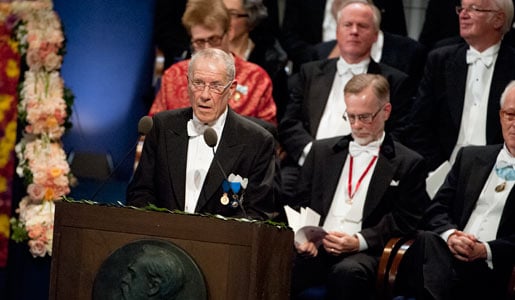Award ceremony speech
English
Presentation Speech by Per Wästberg, Writer, Member of the Swedish Academy, Chairman of the Nobel Committee, 10 December 2012.

Writer Per Wästberg delivering the Presentation Speech for the 2012 Nobel Prize in Literature at the Stockholm Concert Hall.
Copyright © Nobel Media AB 2012
Photo: Alex Ljungdahl
Mo Yan is a poet who tears down stereotypical propaganda posters, elevating the individual from an anonymous human mass. Using ridicule and sarcasm Mo Yan attacks history and its falsifications as well as deprivation and political hypocrisy. Playfully and with ill-disguised delight, he reveals the murkiest aspects of human existence, almost inadvertently finding images of strong symbolic weight.
North-eastern Gaomi county embodies China’s folk tales and history. Few real journeys can surpass these to a realm where the clamour of donkeys and pigs drowns out the voices of the people’s commissars and where both love and evil assume supernatural proportions.
Mo Yan’s imagination soars across the entire human existence. He is a wonderful portrayer of nature; he knows virtually all there is to know about hunger, and the brutality of China’s 20th century has probably never been described so nakedly, with heroes, lovers, torturers, bandits – and especially, strong, indomitable mothers. He shows us a world without truth, common sense or compassion, a world where people are reckless, helpless and absurd.
Proof of this misery is the cannibalism that recurs in China’s history. In Mo Yan, it stands for unrestrained consumption, excess, rubbish, carnal pleasures and the indescribable desires that only he can attempt to elucidate beyond all tabooed limitations.
In his novel Republic of Wine, the most exquisite of delicacies is a roasted three-year-old. Boys have become exclusive foodstuff. The girls, neglected, survive. The irony is directed at China’s family policy, because of which female foetuses are aborted on an astronomic scale: girls aren’t even good enough to eat. Mo Yan has written an entire novel, Frog, about this.
Mo Yan’s stories have mythical and allegorical pretensions and turn all values on their heads. We never meet that ideal citizen who was a standard feature in Mao’s China. Mo Yan’s characters bubble with vitality and take even the most amoral steps and measures to fulfil their lives and burst the cages they have been confined in by fate and politics.
Instead of communism’s poster-happy history, Mo Yan describes a past that, with his exaggerations, parodies and derivations from myths and folk tales, is a convincing and scathing revision of fifty years of propaganda.
In his most remarkable novel, Big Breasts and Wide Hips, where a female perspective dominates, Mo Yan describes the Great Leap Forward and the Great Famine of 1960 in stinging detail. He mocks the revolutionary pseudo-science that tried to inseminate sheep with rabbit sperm, all the while dismissing doubters as right-wing elements. The novel ends with the new capitalism of the ‘90s with fraudsters becoming rich on beauty products and trying to produce a Phoenix through cross-fertilisation.
In Mo Yan, a forgotten peasant world arises, alive and well, before our eyes, sensually scented even in its most pungent vapours, startlingly merciless but tinged by joyful selflessness. Never a dull moment. The author knows everything and can describe everything – all kinds of handicraft, smithery, construction, ditch-digging, animal husbandry, the tricks of guerrilla bands. He seems to carry all human life on the tip of his pen.
He is more hilarious and more appalling than most in the wake of Rabelais and Swift — in our time, in the wake of García Marquez. His spice blend is a peppery one. On his broad tapestry of China’s last hundred years, there are neither dancing unicorns nor skipping maidens. But he paints life in a pigsty in such a way that we feel we have been there far too long. Ideologies and reform movements may come and go but human egoism and greed remain. So Mo Yan defends small individuals against all injustices – from Japanese occupation to Maoist terror and today’s production frenzy.
For those who venture to Mo Yan’s home district, where bountiful virtue battles the vilest cruelty, a staggering literary adventure awaits. Has ever such an epic spring flood engulfed China and the rest of the world? In Mo Yan’s work, world literature speaks with a voice that drowns out most contemporaries.
The Swedish Academy congratulates you. I call on you to accept the 2012 Nobel Prize for Literature from the hand of His Majesty the King.
Nobel Prizes and laureates
Six prizes were awarded for achievements that have conferred the greatest benefit to humankind. The 12 laureates' work and discoveries range from proteins' structures and machine learning to fighting for a world free of nuclear weapons.
See them all presented here.
